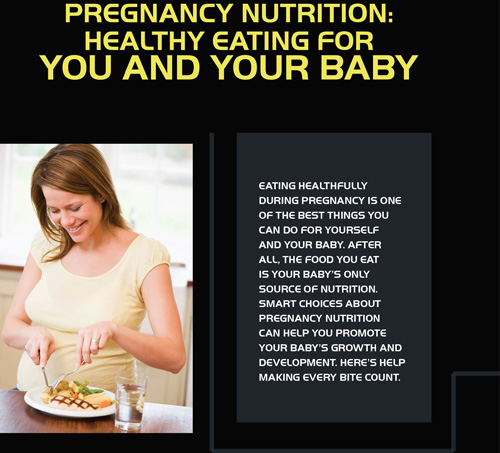Healthy foods are the cornerstone of pregnancy nutrition. Find out what – and how much-to eat.
Eating healthfully during pregnancy is one of the best things you can do for yourself and your baby. After all, the food you eat is your baby’s only source of nutrition. Smart choices about pregnancy nutrition can help you promote your baby’s growth and development. Here’s help making every bite count.
Grains
Grains provide essential carbohydrates, your body’s main source of energy. Many whole-grain and enriched products also contain fiber, iron, B vitamins, various minerals and protein. Fortified cereals can help you get enough folic acid.
How much: Choose six to nine servings a day. If that sounds like a lot, don’t worry. It may not be as much as you think.
One serving equals:
- 1/2 cup (about 120 grams) hot cereal or 1 cup (20 to 60 grams) cold cereal — different cereals vary in weight
- 1/2 cup (about 87 grams) cooked pasta or rice
- 1 slice whole-wheat bread
To optimize pregnancy nutrition, trade sugary cereals and white bread for whole-grain cereals, brown rice, whole-wheat pasta and whole-grain bread. Try wild rice or barley in soups, stews, casseroles and salads. Look for products that list whole grains, such as whole-wheat flour, first in the ingredients list.
Fruits and vegetables
Fruits and vegetables are critical components of pregnancy nutrition that provide various vitamins and minerals, as well as fiber to aid digestion. Vitamin C, found in many fruits and vegetables, helps you absorb iron and promotes healthy gums for both you and your baby. Dark green vegetables have vitamin A, iron and folate — other important nutrients during pregnancy.
How much: Choose five or more servings of fruit and vegetables combined every day. Top your cereal with slices of fresh fruit. Make a veggie pizza. Add extra vegetables to your casserole.
One serving equals:
- 1 medium-sized piece of fruit
- 1/2 cup (90 grams) fresh, frozen or canned fruit
- 2 cups (about 60 grams) raw, leafy vegetables
- 1/2 cup (about 60 grams) cooked or other raw vegetables
- 3/4 cup (about 186 grams)100 percent fruit juice or vegetable juice
If you’re tired of apples, oranges and green beans, branch out. Try apricots, mango, pineapple, sweet potatoes, winter squash or spinach. Make trail mix with a variety of dried fruit. Fruit juices counts too, but remember that too much juice can lead to undesired weight gain.

Meat, poultry, fish, eggs and beans
Foods in this group have plenty of protein, as well as B vitamins and iron. Protein is crucial for your baby’s growth, especially during the second and third trimesters.
How much: Choose two or more servings of protein-rich foods a day. Eat whole-wheat toast with peanut butter for breakfast. Try scrambled eggs or an omelet for lunch. Serve a salmon fillet for dinner. Add chickpeas or black beans to your salad. Snack on a handful of soy nuts.
One serving equals:
- 2 to 3 ounces (55 to 85 grams) of cooked lean meat, poultry or fish (about the size of a deck of cards)
- 1/2 cup (about 100 grams) cooked dried beans
- 1 egg
- 1/2 cup (124 grams) tofu
- 1/3 cup (about 45 grams) nuts
- 2 tablespoons (32 grams) peanut butter
If your traditional sources of protein no longer appeal to you — likely during the first trimester — experiment with other options. Fish is an excellent source of protein as well as omega-3 fatty acids, which can promote your baby’s brain development. Avoid fish that’s potentially high in mercury, however, including swordfish, king mackerel, tilefish and shark.
Dairy products
The calcium in dairy products and calcium-fortified soy milk helps build your baby’s bones and teeth. Dairy products also have vitamin A, vitamin D and protein.
How much: Choose four or more servings a day. Drink the milk in your cereal bowl. Eat yogurt for your afternoon snack. Have a glass of milk with dinner. Add cheese to a salad.
One serving equals:
- 1 cup (245 grams) skim or low-fat milk
- 1 cup (227 grams) fat-free or low-fat yogurt
- 1 1/2 ounces (43 grams) natural cheese
- 2 ounces (about 56 grams) processed cheese
If you have trouble digesting dairy products, get creative. Try calcium-fortified orange juice. Experiment with lactose-reduced or lactose-free products. Use an over-the-counter lactase enzyme product when you eat or drink dairy products.
 Water
Water
Water carries nutrients from the food you eat to your baby. It can also help prevent constipation, hemorrhoids, and excessive swelling, and urinary tract or bladder infections. As your pregnancy progresses, drinking too little water can contribute to premature or early labor.
How much: Drink at least six 8-ounce (237 milliliters) glasses of water a day. Drink another glass of water for each hour of physical activity.
Fats, oils and sweets
There are no minimum requirements for fats and sweets. It’s OK to indulge once in a while — as long as you’re getting the nutrients you need and your weight gain is on target. To avoid going overboard, control your portion sizes.
Ask about supplements
Even women who eat healthfully every day may miss out on key nutrients. A daily prenatal vitamin — ideally starting three months before conception — can help fill any gaps. Your health care provider may recommend special supplements if you follow a strict vegetarian diet or have any chronic health conditions.
Twins or other multiples
If you’re pregnant with twins or other multiples, you’ll likely need more nutrients and calories than a woman pregnant with one baby. Talk to your health care provider about how much more to eat.
Mayo Clinic staff

